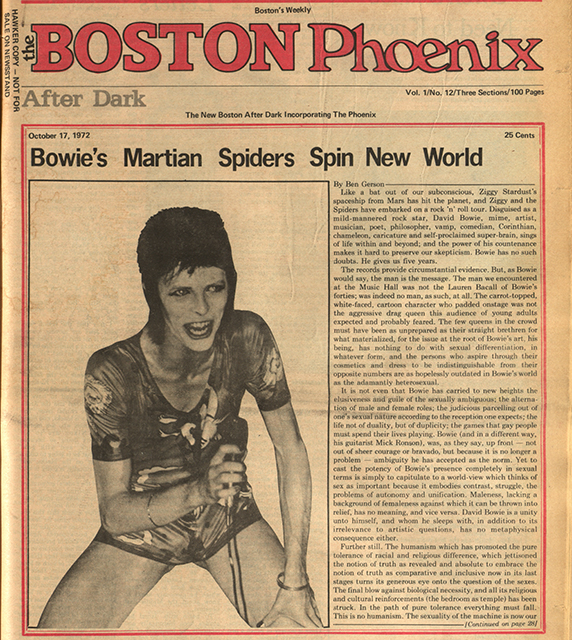When news of David Bowie’s untimely death went public on the morning of January 11, 2016, artists ranging from Madonna to Iggy Pop to Guillermo del Toro made statements of sadness and disbelief concerning the passing of Major Tom. Sleater-Kinney guitarist and Portlandia actress Carrie Brownstein encapsulated it best when she tweeted: “It feels like we lost something elemental, as if an entire color is gone.”
The Boston Phoenix Collection in Northeastern University’s Archives and Special Collections contains reviews, photographs, and articles documenting David Bowie’s artistry, ranging from his music and film careers to his political prowess, even his opinion on Todd Haynes’ controversial Bowie-inspired film, Velvet Goldmine.

The Boston Phoenix won numerous awards for journalism in its lifetime, including in 1994 when classical music writer Lloyd Schwartz was awarded a Pulitzer Prize for Criticism. Ben Gerson’s 1972 article “Bowie’s Martian Spiders Spin New World” highlights the in-depth nature of the alternative newspaper’s music journalism. Showcasing the sexual, political, and artistic nature of Bowie’s music and showmanship, Gerson’s artistic profile of Bowie is beyond music reporting—it is an academic dissection of Bowie’s “Ziggy Stardust” tour. Referenced in Elizabeth Thompson and David Gutman’s The Bowie Companion, Gerson calls Bowie’s body a “laboratory, free of morphological determinants,” analyzing Bowie’s lyrics, performance, costumes, and philosophies.
From a query as to why Bowie would want to perform on the A&E channel’s Live by Request in 2002, to a celebration of “the best record ever made about apocalypse, interplanetary lust, singer-songwriter role playing, and rock-and-roll-as-alien-outsider stuff,” The Boston Phoenix Collection offers insight into the reception of Bowie’s ever-changing identities. An elusive and iconic figure, Bowie is frequently cited as an inspiration not only by newer artists, like Lady Gaga, but also by contemporaries, like Mick Jagger.
To explore the coverage of mainstream and underground pioneers in the music industry visit the Archives in Snell Library.